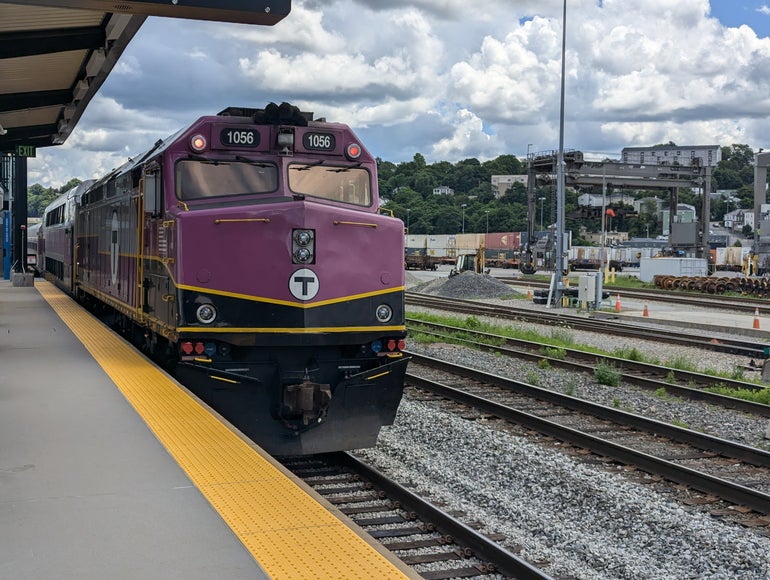A Boston area congressman on Monday positioned himself opposite one of his colleagues from north of the city in one of the longest running debates about transforming the state’s public transit system.
Congressman Stephen Lynch said Monday that he thinks pursuing a connection between Boston’s busiest commuter rail hubs and the Northeast Amtrak network may be a waste of time, given the realities associated with allocating federal funds to the states for larger infrastructure efforts. The rail link proposal has become a priority for Congressman Seth Moulton of Salem.
Some transit proponents have said for years that the state should connect North and South Stations in Boston, which lay only about three miles away from each other, but aren’t directly connected by train tracks, preventing major train operations from flowing through the city. The Massachusetts Department of Transportation estimated in 2018 that the so-called “Rail Link” would cost between $12.3 and $21.5 billion, depending on the scope of the project.
“I live in Salem, Massachusetts,” Moulton said on an episode of the Codcast this summer. “I would never take a job on the South Shore because you can’t get there from Salem, certainly not at rush hour. That could be a two-hour trip in one direction. With the Rail Link, it would be about 40 minutes. So it’s totally transformative… You can live in Worcester and get to the Cape on a Friday afternoon in the summer in no time at all, whereas you could be sitting for three hours in traffic.”
Lynch said at a Greater Boston Chamber event Monday at the InterContinental Hotel that he is skeptical that Congress, especially with shifting political tides in Washington D.C., would be willing to direct needed federal funding to the project. He suggested that instead the Massachusetts delegation focus its efforts on getting money to extend a train rail from Boston to the western part of the state.
He pointed out that travelers can technically get between North and South Station on the T — a subway ride that no matter which way you go requires at least two transfers.
“Having sat on the Transportation Committee, being a party to the debate that goes on between states that we negotiate with: New Jersey has a tunnel they want; Arizona wants to add 500 miles of highway. There are all these competing — Chicago wants to expand their airport — we’re competing for dollars. We sit as a committee and we review the impact. So if we put our project forward and say ‘We want $20 billion for a tunnel so people don’t have to change trains’ — we lose, we lose, we lose,” Lynch said.
Sydney Simon, a spokesperson for Moulton, said recent studies estimate that the price tag for the Rail Link would be $8 billion. Of that, Massachusetts taxpayers would be “on the hook for as little as $1B,” she said.
“The Rail Link is a transformative yet cost-effective project that would connect all of New England,” Simon said.
Lynch, of South Boston, represents areas of Boston and the South Shore, serviced by both subway and commuter rail lines that run into the city.
“I probably shouldn’t be saying this as a member of the delegation from Boston, but let’s be fair, and let’s try to get the most impact. That argument would be valid in Congress, and I think would be a winning suggestion, especially with Congressman Neal if he comes chair of Ways and Means. That’s something that is near and dear to his heart. He would like to see the infrastructure and the rail capacity increased,” Lynch said.
Neal represents 83 cities and towns in the western and central part of the state, and has led the powerful Ways and Means Committee when the Democrats control the House. Republicans have majority control of the chamber for the next two years, meaning Neal won’t chair the committee, and Democrats will try to win back control in the 2026 midterms.
Moulton has said the rail link project could create jobs throughout eastern Massachusetts — both in building the tunnel and opening up access to jobs once employees can travel more easily through the bottleneck area of Boston.
A study released in June, a joint effort between Moulton and the Harvard Kennedy School, said the rail link would quadruple commuter rail ridership and open up access to nearly half a million jobs.
“Think about the allocation of transportation money within our state,” Lynch said Monday. “We have spent tremendous amounts of money in the eastern — speaking to the choir I guess — in the greater Boston area. With the Big Dig, all the money we spent, the $18 billion there. We have spent nothing on the rest of the state.”
He continued, “When you think about the MBTA, all those communities are paying in, and they’re probably not benefitting much from that, right? So here’s a chance, and call it just basic fairness, let’s try to push a project that might help the rest of the state as well, that might help Springfield and Worcester and Pittsfield.”
Moulton’s spokesperson, Simon, said a rail link would help connect the whole state — not just the areas north and south of Boston.
“The Rail Link will enhance all our transportation projects, including West-East Rail, and together address our traffic, housing, and climate challenges. It will incentivize three times the housing created by the state’s housing bond bill. This isn’t a zero-sum choice; this is about delivering on a complete transportation system that will make life better for all Massachusetts residents,” she said.

